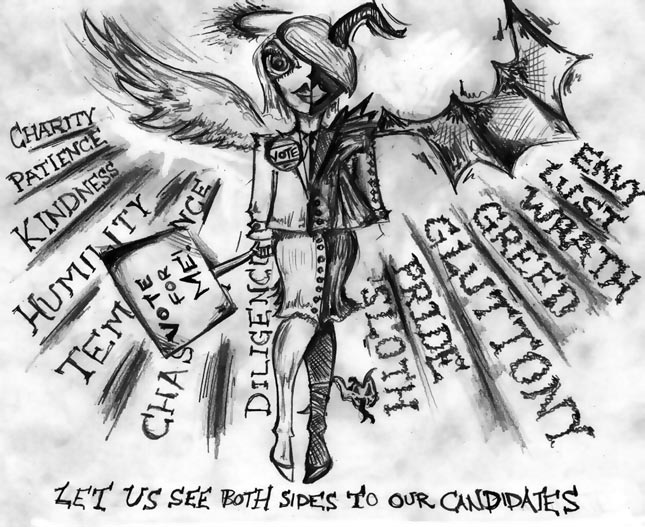
SU should allow negative campaigning
By Caitlyn Madlener, February 26 2015 —
Politicians aren’t the most honest people. Whether it’s the Premier of Alberta trying to cover up an expense scandal, the mayor of Toronto smoking crack or a lowly student representative misusing student money, there’s always some incident, ineptitude or expenditure politicians don’t want voters to know about.
Banning negative campaigning in Students’ Union elections allows candidates to hide these blunders.
Imagine you’re running for the SU and discover that your incumbent competitor has been misappropriating thousands of student dollars to take lavish trips to the Banff Springs Hotel. This fraudulent and dishonest use of student money is something that should affect a voter’s views of the candidate, and attacking the candidate’s decisions would be the responsible tactic.
Unfortunately, the SU has a ban on negative campaigning. Communicating and campaigning on this indiscretion would result in your disqualification from the race and the election of a potentially dishonest and fraudulent candidate.
Allowing negative campaigning would do more than protect us from cases of fraud or ineptitude. Regardless of your political stripe, we all know that politicians over-promise and under-deliver. Negative campaigning helps voters realize the impossibility of many candidate’s unrealistic ideas.
We might like to believe that the faculty of arts representatives can abolish tuition fees, but that isn’t going to happen. Negative campaigning would help hold unrealistic candidates to account.
Negative campaigning also helps educate voters. When you’re buying a laptop, you don’t just look at the manufacturer’s website or take everything the salesperson says for granted. You look for user reviews and see what their competitors offer. You look for both the good and the bad. We don’t ban different laptop manufacturers from “negative advertising,” or ban people from reviewing products just because their opinion isn’t positive enough.
The SU’s policies hinder us from becoming more informed voters and they tarnish our university’s reputation for free speech. This particular policy was a significant factor in the SU’s “F” grade on the 2013 Justice Centre for Constitutional Freedom’s Campus Freedom Index. University is about freedom of expression, even for ideas we find contentious or distasteful.
Concerns about negative campaigning appear legitimate. People fear that a candidate’s character might be besmirched. Though compassionate, this is a bad argument. Tarnishing the character of a dishonest and fraudulent candidate is a good thing. If a candidate is inappropriately attacked, that isn’t “negative campaigning” — it’s libel. And the notion that negative campaigning will hurt a candidate’s feelings is disappointing at best. No student can spend their entire life sheltered from mean words.
Not everyone voting in the SU election has the time, resources or motivation to research every candidate. Negative campaigning allows us to outsource this to other candidates who invest their time and money in the election. Without negative campaigning, no candidate would ever discuss their own shortcomings. Negative campaigning exposes the things that informed voters should be talking about.
Our ban on negative campaigning is an unfortunate aspect of student democracy. Our campus should be a place for discussion, even if that discussion becomes heated, negative or inflammatory. If you disagree, go ahead and negatively campaign against it.
